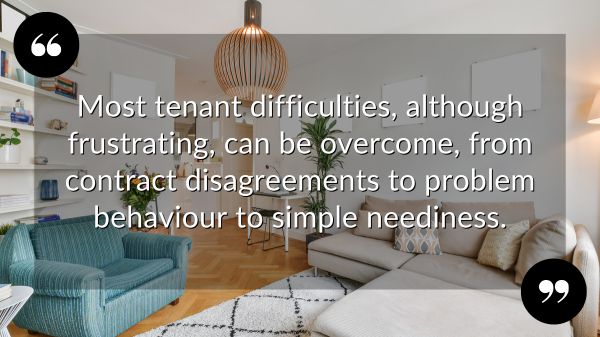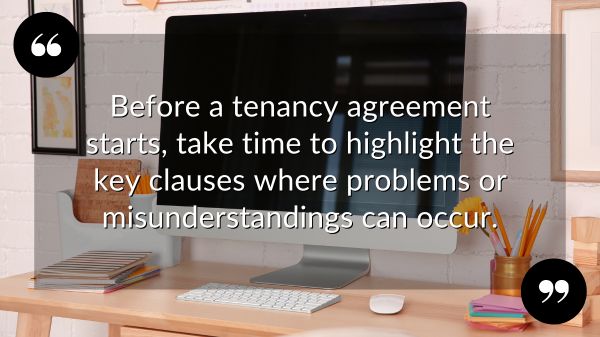While most tenancies run their course without a major hitch, ending up with difficult tenants is a real concern for landlords, and we're often asked how we spot and avoid potentially troublesome candidates.
Years of experience and a rigorous referencing process help us eliminate most of the risk, but you can never really know how someone will react to a problem or dispute until one comes along.
Often, the ‘difficult’ label is pinned on a tenant who behaves or communicates in a way that feels jarring or tricky to handle, which can spiral into a yucky mix of frustration, exhaustion, and resentment.
Fortunately, there are ways to minimise the chance of difficulties in the first place, and to diffuse the drama if it ever occurs. With that in mind, let's dig a little deeper into:
- What does ‘difficult’ look like?
- Creating contract clarity
- Handing over for harmony
- Cooling down conflicts
- When ‘difficult’ turns to ‘bad’
Hopefully, you can already see that it’s a lot more nuanced than “a difficult tenant is automatically terrible”, and our guide is here to help you handle any situation with greater confidence and control.

WHAT DOES ‘DIFFICULT’ LOOK LIKE?
The term "difficult tenant" covers a broad spectrum of behaviours. Often, the root cause isn't down to malicious intent, but simple differences in communication or understanding, such as:
- Contacting you constantly for minor issues that fall under the tenant’s own responsibility, or being completely unresponsive and making maintenance and repairs a logistical challenge.
- Misinterpreting the tenancy agreement, leading to arguments over noise levels, nuisance behaviour, access for inspections, or conflicts with other housemates or neighbours.
- Allowing personal issues and emotions to influence their interactions, making your tenant appear demanding or difficult when they might just be having a tough time.
While frustrating, most of these are usually resolvable with the tips in this blog, and you can find even more in our other articles on Tenant Troubles and Needy Tenants.

CREATING CONTRACT CLARITY
One of the best ways to avoid tenant difficulties is to design them out from the beginning. A watertight tenancy agreement is obviously essential, but that isn’t quite enough.
The reality is that most of us don’t read every single term and condition of every agreement we sign, and the same goes for tenants. So, before the tenancy starts, take the time to:
- Highlight the key clauses of the agreement where problems or misunderstandings typically occur.
- Draw the tenant’s attention to their responsibilities around appliance care: defrosting the fridge, cleaning the oven, refilling dishwasher salt, keeping the washing machine mould-free, etc.
- Emphasise any clauses for mid-tenancy inspections, quiet times, security measures like locks or alarms, and what they can and can't pour down drains or flush in the loo.
Getting all of this clear at the outset can go a remarkably long way in preventing potential difficulties down the line. In short, never assume a tenant has read and understood everything; make sure of it.

HANDING OVER FOR HARMONY
Beyond setting your tenancy up on the correct legal footing, you can also make sure you hand over a property that nurtures a friendly, responsible and respectful relationship with your tenant by:
- Supplying instruction manuals for all appliances. If you've lost the originals, you'll generally find a PDF to download and give to your tenant by typing the make and model into Google.
- Ensuring your property is thoroughly cleaned to a professional level. Include windows, floor coverings, paintwork scuffs, kitchen appliances, and mould on tiles or sealant.
- Servicing every appliance regularly and completing any outstanding repairs by the move-in date. Give your tenant a clean slate to start with, instead of a series of mild or major annoyances.
Handing over your property all spick an span will show your tenant how you do things, help them meet their responsibilities, and deliver a clear message over how you expect your property to be treated.

COOLING DOWN CONFLICTS
If years of managing rental homes in the Wilton and Salisbury area have taught us anything, it’s that adapting our communication to individual landlords and tenants makes our work far more effective.
No tenant is at their best when the roof leaks or there's no hot water for a shower, but just like dealing with colleagues at work, you can influence how things pan out with your own actions and words.
- If something falls under your tenant’s responsibilities, explain that clearly and calmly and point them in the direction of the instruction manuals you supplied or another helpful resource.
- For other issues, respond quickly and ask for a complete picture of exactly what has happened. The problem won’t disappear, and ignoring it will usually cost you more in the long run.
- Using language like “I understand the situation is frustrating, and I’m taking it seriously” or “Thanks for explaining things so clearly; let’s see what can be done” can work wonders.
Even when you think "I shouldn't have to do this”, a fast response and keeping in touch with progress is the magic formula in taking the heat out of any situation so everyone keeps their cool.

WHEN ‘DIFFICULT’ TURNS TO ‘BAD’
As we said at the start of this blog, most tenancies steer clear of major drama, but what happens if your tenant breaches the terms of their contract? This can be challenging to deal with, but it can't be ignored.
Whether it's rent arrears, antisocial behaviour, or damage, act quickly, keep it professional, and stay focused on a solution. Avoid getting personal, which only escalates situations.
- Write to your tenant (text or e-mail is fine at this stage) citing the clause in the agreement they've breached, what they should do to put things right, and by when. Be firm, fair, and polite.
- If that doesn't do the trick, follow up with a firmer approach, stating that you will look to end the tenancy if the situation isn't rectified immediately. Keep inviting dialogue.
- Still no resolution? The next step is to serve your tenant with a physical notice to leave, which is a different process depending on whether your property is in England, Scotland, or Wales.
Remember: if the worst comes to the worst and you need to pursue eviction, you’ll need a paper trail of resolution attempts and correctly served notices to stand a chance of a court order. Don't cut corners!
Are you having difficulties with your tenant?
We hope the tips in this blog will help you navigate situations with finesse, but if you'd rather not do this alone, we’d love to show you how we can handle everything for you.
If you own a rental home in the Wilton and Salisbury area and you’d like to be looked after and valued, call us on 01722 580059 or email us at info@piccoloproperty.co.uk. Let’s talk about you, and how we can work together.






Share this with
Email
Facebook
Messenger
Twitter
Pinterest
LinkedIn
Copy this link